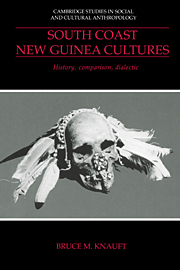Book contents
- Frontmatter
- Contents
- List of figures
- List of tables
- Acknowledgments
- 1 Language-culture areas of south coast New Guinea
- Part 1 Grounding
- Part 2 Critique
- 3 Sexuality in the regional analysis of south New Guinea
- 4 The analytic legacy of homosexual emphasis: language, subsistence, and political economy
- 5 Women's status
- 6 Trends in comparative analysis
- Part 3 Reconfiguration
- Appendix: evidence concerning Asmat homosexuality
- Notes
- List of references
- Index
- Cambridge Studies in Social and Cultural Anthropology
4 - The analytic legacy of homosexual emphasis: language, subsistence, and political economy
from Part 2 - Critique
Published online by Cambridge University Press: 04 December 2009
- Frontmatter
- Contents
- List of figures
- List of tables
- Acknowledgments
- 1 Language-culture areas of south coast New Guinea
- Part 1 Grounding
- Part 2 Critique
- 3 Sexuality in the regional analysis of south New Guinea
- 4 The analytic legacy of homosexual emphasis: language, subsistence, and political economy
- 5 Women's status
- 6 Trends in comparative analysis
- Part 3 Reconfiguration
- Appendix: evidence concerning Asmat homosexuality
- Notes
- List of references
- Index
- Cambridge Studies in Social and Cultural Anthropology
Summary
Several authors have recently used ritualized homosexuality as the basis for elaborating a series of generalizations about south New Guinea. These posit homosexuality as a crucial correlate of marital, political, and economic practices presumed general to the region.
Ritualized homosexuality in the central portion of the south lowlands was indeed linked to the belief that male initiate novices should be inseminated to give them male life-substance for growth and maturation (Herdt 1984a). In the comparative south New Guinea literature, this notion is expanded; ritualized male homosexuality is reasoned to reflect male autonomy from women in both cultural reproduction and male status acquisition, notwithstanding the strong countervailing emphasis on ritual heterosexuality along the south coast. Lindenbaum (1984:339, 343) and Feil (1987:ch. 7) correspondingly reason that male cultural autonomy in “homosexual societies” engenders lack of male status dependence on female productive labor, with men's status being dependent on their own semen-exchanges rather than on surplus production of valued foods or material goods (cf. Whitehead 1986). As a result, south lowlands production systems are said to support only direct rather than delayed exchange, for example, entailing person-for-person exchange in marriage and warfare rather than large-scale wealth exchanges in bridewealth or homicide compensation:
Homosexual societies are thoroughly ‘egalitarian’ in ethos. Restricted, direct and balanced exchange predominates; asymmetrical or delayed reciprocity has no place in social arrangements.
(Feil 1987:178)- Type
- Chapter
- Information
- South Coast New Guinea CulturesHistory, Comparison, Dialectic, pp. 60 - 85Publisher: Cambridge University PressPrint publication year: 1993



